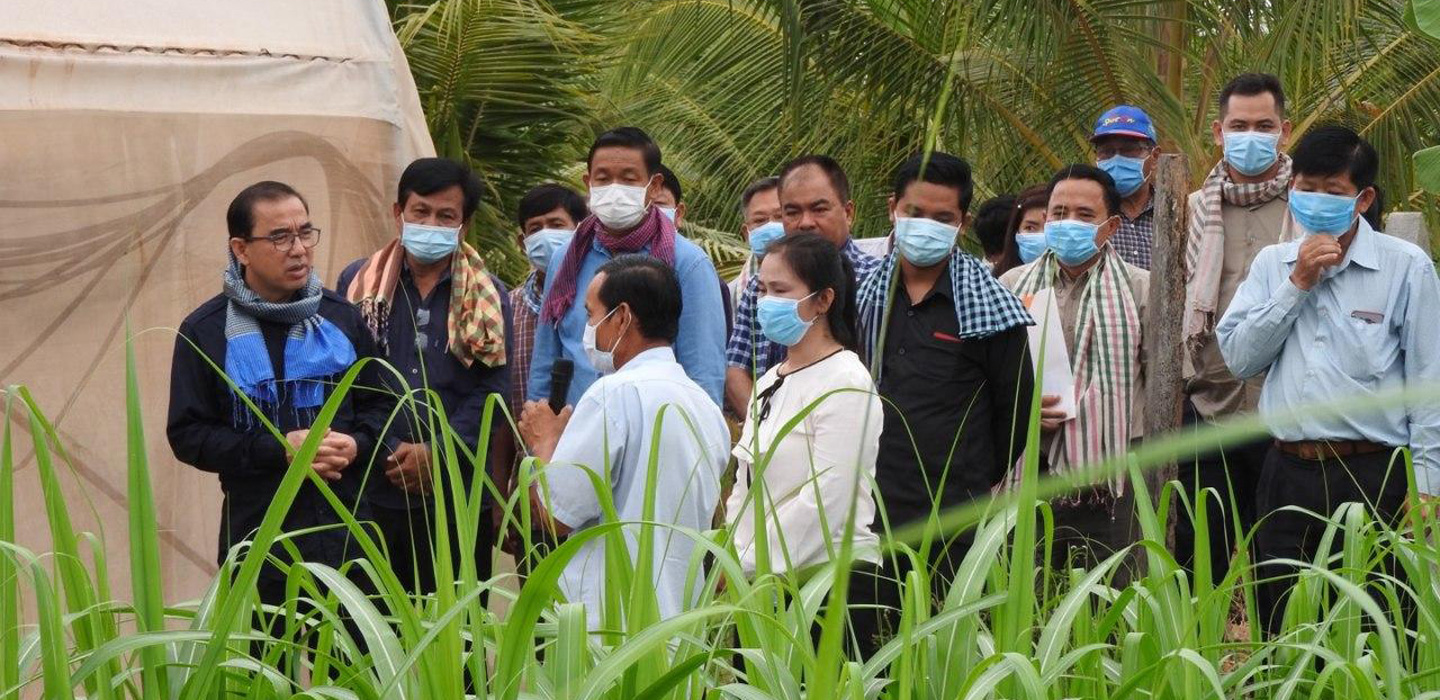Supporting Cambodian farmers during the COVID-19 pandemic
IFAD Asset Request Portlet
Asset Publisher
Supporting Cambodian farmers during the COVID-19 pandemic
Estimated reading time: 3 minutes
H.E. Veng Sakhon, the Cambodian Minister of Agriculture, Forestry and Fisheries, accompanied by the ASPIRE team, visits farmers from the ASPIRE vegetable business cluster in Prey Thom Baitang Cooperative, Prey Thom Village, Touk Meas Khang Lech Commune, Banteay Meas District, Kampot Province, on 8 April 2020.
With a consistent focus on growth and development, Cambodia has made remarkable progress and achieved lower-middle-income status. Over the last three decades, it has grown its economy by 7.5 per cent on average, reducing the rate of poverty from around 50 per cent to around 10 per cent of the population. But now, the COVID-19 pandemic threatens to strain not only the national health system, but the entire economy.
Cambodia is a small country, and has extensive trading relations with other South-East Asian economies such as Thailand and Viet Nam as well as supply chains that are deeply integrated with China. Although the health toll of the pandemic has been low, with under 150 confirmed cases as of this writing, the Government is on high alert and is wary of a late spike. Stricter social distancing measures are progressively being implemented. On the economic front, the Government could allocate up to US$2 billion to address the fallout – but the economic toll of the pandemic is already visible.
The economic effect is being transmitted through three routes: global developments and the upcoming recession affecting export-oriented sectors; severe limits on the tourism sector due to global travel restrictions; and increasing pressures on those supply chains that are integrated with Chinese markets. These developments might dampen Cambodia’s GDP growth and employment.
IFAD works with communities in rural areas of Cambodia. These regions are particularly vulnerable to the current economic distress. Although some of the economic effects are centred in urban areas, rural families – who typically have family members employed in these cities as wage labourers, as workers in export-oriented sectors, or as waiters, chefs, guides or tuk-tuk drivers in the tourism or tourism-adjacent sectors – are also losing income. Furthermore, small and medium-sized enterprise owners and employees are witnessing a loss of income due to reduced demand. Additional economic pressure is also coming from family members returning from neighbouring countries and cities due to the fears and restrictions that the pandemic is generating. At the same time, restricted or disrupted imports of food commodities could impinge on food security.
To both address the economic distress and prevent food security stresses, IFAD and Ministry partners are leveraging a programmatic approach and synergies across projects to respond to the COVID-19 pandemic. There’s a twofold focus in terms of objectives: one, addressing the immediate economic needs of rural communities and creating opportunities for migrant returnees; and two, expanding prospects for smallholder farmers through enhanced production support and through focusing on the appropriate value chains and commodities to ensure adequate food production and dietary diversity.
With guidance from the Government, the IFAD country team has held regular consultations with all partner Ministries in Cambodia. Meetings are held via video conference to ensure the safety of all. The Ministry of Economy and Finance, the Ministry of Agriculture, Forestry and Fisheries (MAFF), the Ministry of Commerce (MOC), and the Ministry of Rural Development are all partner Ministries implementing IFAD-supported projects or components thereof. The new programmatic approach has embedded the ethos of collaboration: partner Ministries have committed to coordinate resources, efforts and information to support the collective effort. At a broader policy level, IFAD is also aligning its approach with other UN agencies, including the other Rome-based food agencies, FAO and WFP.
Production support including seeds, fertilizers and enhanced irrigation support will focus on commodities with short production cycles to meet immediate shortfalls if they arise. The Agricultural Services Programme for Innovation, Resilience and Extension (ASPIRE) project, led by MAFF, is focusing immediately on maintaining production of green leafy vegetables and chicken eggs as key components of the local diet. Meanwhile, the MOC-led Accelerating Inclusive Markets for Smallholders (AIMS) project is reorienting some of its resources to provide on-farm irrigation assistance to farmers to support their production of such commodities.
While travel from the capital and large urban centres has been restricted, greater autonomy has been granted to provincial staff, who are providing direct support to farmer groups and value chain partners. Extension services to existing and returnee farmers are also being delivered through online and tele-based services, including Skype calls, SMSs and phone calls, to ensure maximum social distancing in order to suppress the spread of the virus. Digital tools are being developed in rapid time and should be available in a few months, including an interactive map tracing beneficiary households, as well as farmer diaries that can be updated online. In an age of social distancing, these digital tools will ensure that value chains remain effective.
Many of our Ministry and provincial partners of a certain generation endured and survived the worst excesses of the Khmer Rouge regime. Although there is concern across the large (virtual) room, there is another sentiment that’s clear to all of us: a quiet determination to join hands and overcome this crisis.
Publication date: 17 April 2020